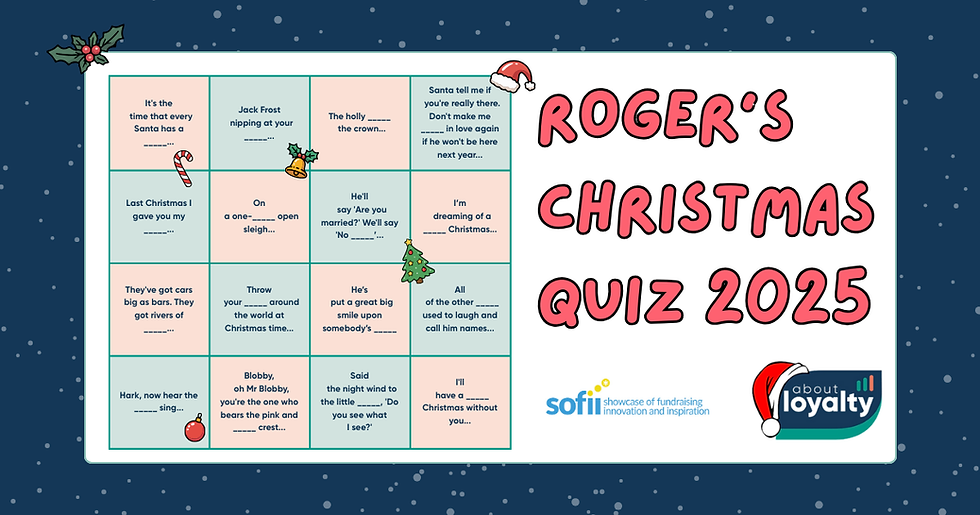Why it's key for fundraisers to understand supporter loyalty
- Roger Lawson

- Jun 25, 2021
- 3 min read
Updated: Jul 5, 2021
I'm delighted to have been asked by SOFII to share some inspiration and insights on what loyalty is all about.
Part one of my series of blogs on the SOFII site explains what loyalty is (and isn't), and why having loyal supporters is so important for charities and their fundraising.
Here it is:
What is loyalty? Take a second, just pause to think about this… loyalty? It’s a word we all use. But what do we mean by it?
Firstly, we need to consider what loyalty isn’t. Loyalty isn’t retention. Loyalty isn’t repeat giving. It’s not upgrades, nor is it even gifts in wills. These things are all important, but they are behaviours. They might be the overall goals of a charity’s ‘loyalty programme’, but they aren’t loyalty.
Think for a second of an organisation that matters to you. Perhaps it’s a particular brand of coffee, a clothing label, or a car, or it could be a sports team, a political party, or a charity.
What makes you loyal to that organisation is how you feel about it. And how loyal you are affects how you behave.
I’m a loyal supporter of Reading Football Club. I give it my time and my money. It’s the only reason I’ll dress up in blue and white hoops. When we’re top of the league (as we were at the start of the season) I feel optimistic (and surprised, if I’m honest!) but my wife will tell you what mood I’m in if we lose on a cold Tuesday evening. Notice I say ‘we’ – I’m that invested in it.
I can guarantee that most people reading this will have a different definition of what loyalty means. And for a sector that in recent years has experienced a major fundraising crisis, regulatory reform, the introduction of General Data Protection Regulation (GDPR), and now the impact of coronavirus on both us and our supporters, this is a problem. It’s time to realise just how fundamental loyalty is to our fundraising and to grow our understanding of it – which means knowing what loyalty is.
Loyalty is how your donors feel about you. True loyalty is full of love and excitement and commitment and desire. It’s based on sharing your values and your goals. It’s the feeling that makes you prefer one over another, and which makes you want to help when there is need. Loyalty is the passion a supporter feels for you and your cause, which means they want to support you long into the future.
In the commercial world, big brands work hard to win loyalty – for increased and repeat sales and lifetime value, and for brand ambassadors who share positive stories, reviews and recommendations that influence others. As charities, shouldn’t we be looking at this too? Loyalty is emotional. It’s irrational. And, when you get it right, it’s irresistible. Loyalty is what makes people want to give, and then continue giving.
Through our research into donor loyalty we’ve developed a robust measure that enables us to give every donor a loyalty score. In our work with more than 20 charities over the last six years, this has shown us that a one-point increase in a donor’s loyalty score leads to over five per cent more of them giving the following year. Putting this into context, for 20,000 supporters donating an average of £50 per annum you could raise an additional quarter-million over four years, while your supporters experience an enriched relationship with their favoured charity.
And what’s more, supporter loyalty can lead to so much more than further donations. Our research shows that the most loyal supporters are also nine times more likely to promote your cause to their own networks and they are five times more likely to leave you a gift in their will.
When we help our supporters develop a genuine sense of passion and love for the causes they care about, we enable loyalty, as well as a sustainable fundraising programme.
So, when we talk about supporter loyalty, we must do so with the understanding that this means the way supporters feel – the passion evoked by your cause and your stories and communications. For it is this passion that will create the long-term, valuable and happy supporters that we all strive for.



